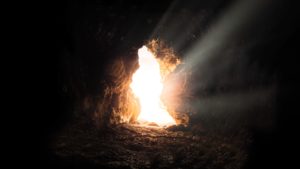In July 2023, record monsoon rains in North India took the lives of more than 100 people. On Wednesday night, a massive landslide in Maharashtra’s Raigad district took the lives of at least 22 people. How can Christians make sense of God and the heart-breaking reality of natural disasters?
The story of the Bible flows through creation, fall, redemption, renewal, and new creation. This narrative should shape how Christians think about God and natural disasters. In Christ, God is “reconciling all things to himself” (Col. 1:20).
Earthquakes, floods, and other natural disasters remind us that creation groans to be redeemed and renewed, along with the rest of humanity (Rom. 8:19-23). At such times, we can remember there will be a day when this present creation will give way to the new creation (Isa. 65:17).
In the promised new heavens and new earth, there will be no more death, neither shall there be mourning, nor crying, nor pain anymore, for the former things have passed away (Rev. 21:4).
The Complications of a Fallen World
Every natural disaster reminds us that we live in a broken, fallen world. Some of its brokenness comes from the fall of creation. However, sometimes its causes are the contribution human beings have made to the world.
On Wednesday, renowned water conservationist Rajendra Singh said the floods in Delhi are a human-made disaster, not merely a result of climate change or natural events.
In this fallen world, God has called us out as kingdom citizens, as agents of the King, crying out, “Thy Kingdom Come.” God commissions us to advance the kingdom of God through our daily lives, work, engagement, and prayers.
The kingdom of God is already inaugurated and advancing. We cannot forget this in times of natural disasters.
The kingdom of God is “already here, but not yet.” We live between the present, fallen creation and the coming, new creation. In this time, we live as kingdom citizens who display the character of the King—love, compassion, care, justice, righteousness, and the like.
Natural Disasters in the Bible
Natural disasters in the Bible do not give us any clarity to judge each and every event. We will not always know the “why” of it.
There are natural disasters which indicate that it was to judge those who have sinned against God (Deut. 28:15-68; Num. 16:31-35; 1 Kings 17:1, 1 Kings 18:18). Others were permitted to bring disobedient people to repentance (Lev. 26:14-20, Hag. 2:17).
Every natural disaster reminds us that we live in a broken, fallen world.
Some events helped God’s people to overcome opposition from their adversaries (Ps. 78:42-51: Ex. 8:6, 17, 24; Ex. 10:13-15; 1 Sam. 14:15-16). Others demonstrate God’s power and reveal his nature (Matt. 27:51; Ezek. 38:17-23). Some warn that the end is near (Rev. 8:5; 11:13).
At the same time, there are many natural disasters without any explanation. Nations faced drought; people arid regions experienced famine (Gen. 12:10, 41:53-54, 47:13). Earthquakes affected communities living in the rift valley, a seismic area (Amos 1:1, Zech. 14:5).
Jesus spoke about the injustice the Galileans faced at the hand of Pilate, as well as the people who died when a towel fell on them (Luke 13:1-5). He did not attribute these events to anyone’s sin or consequent punishment.
As Os Guinness says, “You don’t always see enough to come to a conclusion, but once you’ve seen a little it’s difficult to resist trying. This mistake is the essence of key hole theology. There are times when we see glimpses of God’s ways but not enough to allow us to make true conclusions about what he is doing and why. . . .
Human beings are finite and the world is now fallen and the life will contain many mysteries opaque to the searcher. . . .
At times we see through a dark glass partially or, as it were, through a key hole partially. . . .
We always have sure and sufficient reasons for knowing why we can trust God, but do not always know what God is doing and why.”
God’s Nature and Natural Disasters
Good outcomes can follow natural disasters. The drought in Israel and the Middle East led Jacob and his sons to move to Egypt when Joseph was ruler of the land, second only to Pharaoh.
Other disasters in the New Testament era gave opportunities for Christians to share their wealth and belongings with one another and with non-believers. The earthquake in the prison in Philippi offered an opportunity for the jailer and his household to turn to Christ.
No matter what the event, while we may not understand it, we would be wise to avoid questioning the character of God, who sees the big picture. Nor should we misrepresent God by our partial understanding, pronouncing judgment where there is none.
When a natural disaster strikes us, we should focus on what we can do to mitigate pain and suffering.
God is loving and good. He is not one who delights in judgment for judgment’s sake. He is in the business of ushering in the new heaven and new earth.
The Lord is gracious, compassionate, slow to anger, and abounding in steadfast love. He is compassionate and caring. God aligns himself with people in the margins of society. He is pained by the suffering his creation endures, as it waits for the fulfilment of the ages.
Our God is a covenant keeping God. He made a covenant with Noah that he will not destroy the whole world through another massive flood. This gives us a glimpse into his merciful heart. At the same time, he is Sovereign over all things. He alone can bring good out of every situation.
As Os Guinness also writes, “our misrepresentations of God are so pathetically inadequate or monstrously hideous that to believe in him any longer is unnecessary or repugnant.”
C.S. Lewis, in the middle of his grief, recognised this and wrote, “Not that I am in much danger of ceasing to believe in God. The real danger is in coming to believe such dreadful things about him.”
Prioritising Practical Responses to Natural Disasters
When a natural disaster strikes us, we should focus on what we can do to mitigate pain and suffering, not on why it happened. We should be asking, “How can we be the hands and feet of our compassionate and caring Master?”
In his book Where is God When It Hurts? Philip Yancey says, “Suffering is not a direct act of God which we must swallow as punishment. . . .Jesus himself spent his life on earth fighting disease and despair. . . .As members of a stained planet, we have the right, even the obligation, to battle the negative side effects of man’s fall.”
Our response should be to care for the whole person—the physical, emotional, the social, and the spiritual needs of individuals, families, and communities. In that response, constrained by love, we should come alongside those in pain—being the arms of a caring God and bringing the comfort only God can give through his weak and broken vessels.
If we are constrained by such love, we will be showcasing the beauty the gospel to people and sharing the love of Christ through our words and deeds.












